9.11.2006
Five Short Long Years Later
In early 2001 I was hired to work on a project for TLC about two elite Rescue units, Rescue 1 and Rescue 2, in the New York Fire Department. It was to be an action show, like "Cops" with firefighters. The men who were to be the subjects did more firefighting, according to statistics, than almost any other fire units anywhere. They were experts not only in battling blazes but also in special operations such as scuba, rappelling, and building collapses. A particular specialization was rescuing other trapped firemen, and they were proud to tell you that they were "the last men out" of any fire situation. One of the producers was the nephew of the Rescue units' fire chief, and one of the production's selling points was unprecedented access. A small crew would live in the firehouses and ride on the "rigs" as they tore through Manhattan or Brooklyn on the way to "a job." It was my first TV or documentary project as an editor, and I also filled in and did some shooting because there were only a handful of us working on it.
So for a number of days in the Winter and early Spring of '01I had the rare opportunity to ride on a fire truck, trying to operate a little PD150 DVCAM in one hand and hold on for dear life with the other. Or hang out with some of the FDNY's finest in their firehouse kitchens, trying not to take too much verbal ribbing. They called me "River," apparently because of a likeness (which I've never gotten) to a particular tragically deceased young actor. I suppose River is better than Luke. On one day, I rode with Rescue 2 through the Brooklyn-Battery tunnel as they responded to a fire in the PATH train station at the World Trade Center. The fire turned out to be totally inconsequential and was out by the time we arrived. But the Rescue units were called, as well as what looked like half of the entire New York Fire Department, because of what I was told was the city's special "sensitivity" about that location. Amid the chaos of pedestrians, police and firemen, I think I was trying to get a shot that would convey the hugeness of the FDNY response, just to have something that might be at least potentially usable in the show. I got separated from my guys and the other cameraman/producer and the rig took off without me. This was a source of much amusement back at the firehouse.
But, anyway, the irony was that there wasn't really much to edit because somehow we kept missing the big jobs. If an action-packed fire happened in the city during those months it almost always seemed to fall on days that no one was shooting. So we stopped trying to cut and I came back to LA that Summer, planning to return in the Fall after the producers had gathered more action-oriented footage.
Then, of course, 9-11 happened. Every man from Rescue 1 and Rescue 2 who was on duty on that morning, plus some off-duty members who had gotten into the city in time, totaling roughly half of the firemen who had been filmed and mic'd for our show, were killed. They were in the North Tower when it collapsed. It's thought that they had made it to near the top, where the fire was. We'll probably never really know.
What happened next for me is a long and mostly boring story. To sum up, I returned to New York to work on what would become a very different kind of show. It would tell the story of the firemen before and after, the ones who died and the ones left behind. We re-examined everything that had been shot, because now the "dull" material of guys hanging out in the firehouse kitchen had a lot more meaning. Formal interviews, which would never have been part of the "verite" style of the originally-intended show, were shot with the survivors using the new Sony 24p HD. Panavision New York donated the rental, which made it possible. It took the better part of a year to create "Still Riding," which aired on TLC on the one-year anniversary. It's a film which I'm really proud of, and in my biased opinion it deals with the firefighters' experience of the event, and even with experience of being a firefighter itself, better than any of the other 9-11 docs. I would love for it to be seen more, but that's not up to me.
My personal involvement with the 9-11 atrocity is quite insignificant compared to the tens of thousands of people who lost loved ones. I try not to make a big deal of it. But there is some emotion in having known, if briefly, a dozen or so of those guys. And not just because of how they died, but because of who they were and what they did. They were extraordinary people. Colorful, certainly. Very typically not "politically correct." But they risked their lives, for strangers, on a daily basis. They had the kind of courage that most of us have no direct understanding of. That's humbling.
I've made an effort to avoid a lot of the recent 9-11 movies. Mainly, I'm not so interested in all of the miraculous survivals or the rescues from the rubble that seem to be such popular subect matter. At the risk of sounding morbid, I don't believe they fairly characterize the World Trade Center Disaster. A few miracles happened, certainly. But that day was about massive loss of life -- on the part of people who went to work on a Tuesday morning and the heroic public servants who worked to save them. An immensity of death, carnage, and suffering. Hollywood makes a movie like Oliver Stone's because stories of survival allow for happy endings. "Still Riding" doesn't have a happy ending. The world we find ourselves in today, which has been so affected by what happened on that morning, hasn't had one either.
The best thing we can hope for now is to learn from this.
I've been thinking. I try to avoid politics here, mostly, because that's not ostensibly what our little nook of the blogosphere is for. And I don't really want to put off anybody who doesn't agree with me/us. I feel strongly, however, that a responsible and important part of commemorating 9-11 is thinking clearly and carefully about everything that has resulted from it. What has resulted from it has been a lot more death and a lot more destruction, most of it just as senseless.
On September 12, 2001, world sentiment was, "we are all Americans." This changed rapidly, of course, as the world watched what came next. A "War on Terror" sounded like a necessary thing back then. Like everyone else, I was angry, I felt that old reliable and familiar human impulse -- strike back. Fight fire with fire. Kill the bad guys. The nation cheered when the president stood on the rubble and proclaimed, "The people who knocked these buildings down will hear all of us soon!"
The military mission in Afghanistan made sense, because that's where the bad guys were. Al Qaeda, harbored by the Taliban regime, had a bona fide network of training camps and bases from which to launch more terrorist attacks. Removing their capability to do so certainly required the use of military force. And the U.S. forces succeeded in driving Al Qaeda from its hideouts and ousting the Taliban from its rule. For a time, it seemed like we were winning in Afghanistan. For a time. Now, ironically, we know that the administration did not commit enough resources to doing it right. It failed to prevent Osama Bin Laden from escaping during the war there, and now Taliban/Qaeda forces have regrouped. Most of the country is controlled by tribal warlords. What accounts for our failure to stabilize Afghanistan? Many have claimed that the needs of the Afghan campaign were neglected, specifically because resources were rerouted to the planned war in Iraq.
How did the horror of 9-11 lead us, as a country, to the invasion of Iraq?
I think it's a fair statement that only the delusional still see the Iraq war and occupation as anything less than a massive, tragic debacle. Saddam Hussein and Al Qaeda had no connection, no history of or plans for cooperation. Hussein had no nuclear or chemical weapons with which to attack anyone, largely because the U.N sanctions had been successfully keeping him in check. (The Senate Intelligence Community is the latest official body to once again affirm this.) These are facts, not matters up for debate if one lives in the "reality-based community." Furthermore, there is strong evidence to suggest that the Bush Administration knew these things, but pushed ahead with plans to invade Iraq while using the threat of terrorism to justify its goals. Their true reasons for taking Iraq likely relate to oil supply, Israel, China, and a frightening, imperialistic geopolitical scheme about which we have only hints. But that's a whole other story. In the meantime, they've squandered hundreds of billions of our hard-earned tax dollars, many of which have enriched war-profiteering coporations with no-bid goverment contracts like like Dick Cheney's Halliburton. And that's the least of our problems.
 OR
OR 
More than 3000 people, mostly civilians, were killed on 9/11. As of today, more than 2600 U.S. soldiers have been killed in Iraq. Estimates of Iraqi civilian deaths vary. 40,000? 100,000? More? These numbers force us to ask difficult questions. Osama Bin Laden and his kind are unquestionably a hateful and murderous bunch. They're responsible for mass murder under the banner of religious perversion. But who is really the greater terrorist? Who is the greater killer? Who is responsible for more death and more suffering -- Osama or George W?
There's a sick irony in Donald Rumsfeld lecturing us about Moral confusion.
If the United States had moral high ground after 9/11, we have long since lost it. The "War on Terror" has certainly eliminated people who wanted to do us harm, but it has galvanized and created far more. George Bush went to war based on lies. Today he's up to his eyeballs in the blood of innocent children. Sorry to say it that way, but it's true.
Who's safer?
Martin Luther King once said: "Man's proneness to engage in war is still a fact, but wisdom born of experience should tell us that war is obsolete. No nation can claim victory in war. A so-called limited war will leave little more than a calamitous legacy of human suffering, political turmoil and political disillusionment. . . Violence never brings permanent peace. It solves no social problems, it merely creates new and more complicated ones. Instead of diminishing evil, it multiplies it."
In memorializing 9-11 we should remember that violence and war themselves are the real enemy. How do you stop terrorism? How do you eradicate war? Nobody really knows the answer. But it sure ain't dropping more bombs.
-jw
P.S. What do you think? Disagree with me? Leave a comment or email me!
9.10.2006
Steve Goto is my hero!

Anyone who has had a discussion with me about gardening in the last 3 years or so has heard me rant about my "supplier" Steve Goto, owner of Goto Nursery growers of the infamous Gotomato. Steve not only grows about 80 different heirloom and hybrid tomatoes that he sells through various nurseries (like Anawalt Lumber where I buy mine) but he also gives lectures and more importantly he has tomato tastings at various places around the LA area. Now I have been salivating over the idea of these tastings since May when I first heard him talk about them at a lecture and am very happy to report that on Saturday the 9th of September I, Liz Camp, attended just such a tasting.


I arrived to find two long tables covered with rows of paper plates containing samples of about 36 different types of tomatoes in all (and fresh salsa made from their tomatoes and 7 or 8 types of chili peppers that the Goto Nursery folks handed out with care as the hottest measured 350,000 Scoville units- that’s hotter than most but not all habaneros). Each plate of samples was marked only with a number so that names could not affect the ratings. We were each given a toothpick, a pencil, and a scorecard and then we shuffled along the tables sampling away. It was interesting to find out that they actually use the results of these tastings to help them determine which tomatoes to grow more or less of next year. The ratings are given on a 1-5 scale- 5 being our favorite and 1 being our least favorite. I decided to approach the scale as if 3 were average and add or subtract points accordingly. Once we had tasted and scored everything we could turn in our ballots and receive a master list telling us the names that corresponded with the numbers. I made sure to mark my scores on my master list to help me decide what to plant next summer. I do have to say that I was disappointed with several of tomatoes I tried and did hand out a fair amount of twos and a few ones but I did give out more threes than anything else. The tomatoes that did receive my top scores were…drum roll please…
With a score of 4: Tomade, Black Plum, Snow White, Evan’s Italian Plum, and Sweet Baby Girl
And the best tomatoes with a score of 5 on the Liz scale: Sungold Cherry (which is actually growing in our backyard right now), Julia Child (My overall favorite!), Suncherry Extra Sweet, and Sunsugar.
It’s interesting (at least to me) that 3 of my top 4 are cherry tomatoes (Julia Child being the only one that is a regular sized tomato). I was disappointed to find out that Steve is not actually selling Julia Child tomato plants and that seedlings or even seeds for this variety are very hard to come by (I did find one site selling the seeds).
I strongly believe that any other year may have yielded higher scores for many of the tomatoes I sampled. I scored the Carmelo tomato a one, the lowest score, because the sample tasted really REALLY bad. I know that this variety can taste better because I’m growing it right now and the ones out of my garden are way better than that pitiful sample. In talking with Steve as well as other backyard gardeners, they all said the same thing that this summer has been the worst tomato growing summer anyone has had in years. The soggy spring followed by a brutally hot summer gave most people scraggly plants with about one quarter the number of tomatoes the were used to getting (anyone who has seen my sad looking plants can tell that I’m in the same boat). I’m convinced that these bad growing conditions had a serious effect on the flavor of some of these tomatoes as well.
Alas the fall is approaching and I am about to try something I’ve never done before… to grow winter tomatoes. Armed with tips from Steve and four varieties of tomatoes native to Siberia (I’m using these because they are used to a shorter, cooler growing season and can set fruit at much lower temperatures that most tomatoes- any early tomato typically grown in the spring like Early Girl would also work) and I am venturing forth into uncharted territory, figuratively speaking of course as this is all actually happening in our back yard.
Here’s hoping for fresh caprese in December!
Liz
9.07.2006
Summer Makes a Surprise Appearance
The seas were still rough, but after a night of heavy rain and wind the sun came out and allowed for at least one relaxing afternoon on my personal favorite beach in the world. I may be biased, this bit of seashore is the scene of some of my earliest memories.







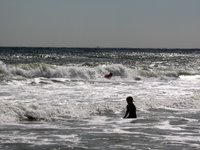






-jw
9.03.2006
Hasta Pronto, Ernesto
Labor Day weekend on the Southampton shore is about the last blast of Summer sun and heat, the last beach picnics of the year, the last of the gentle surf and ocean temps in the mid seventies. Usually.
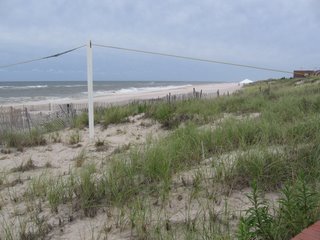
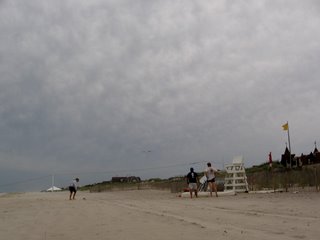
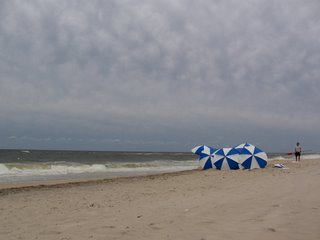
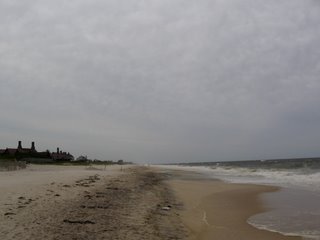
Not that I'm complaining. This is some of the roughest sea we've seen in a long time, but it makes for some unusual scenery. And it's nice to have a break from the heat, considering the kind of Summer we've had in LA.
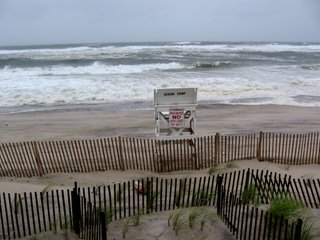
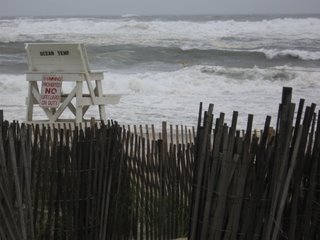
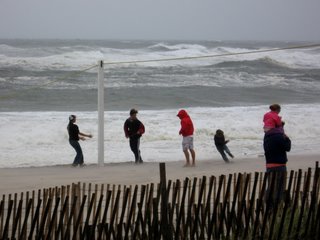
-jw

























